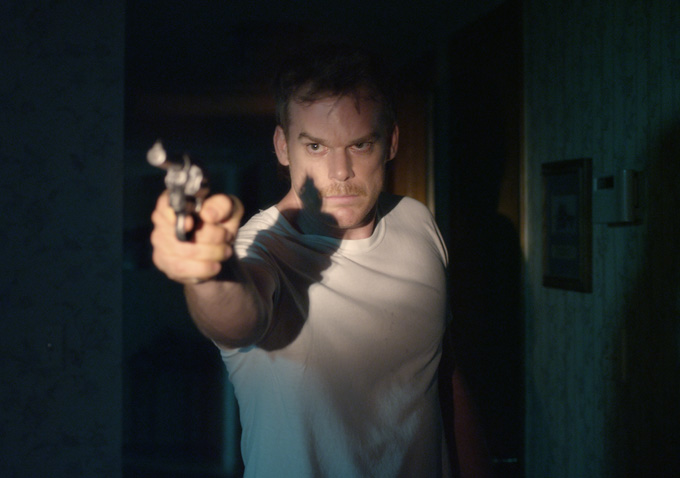
Give filmmaker Jim Mickle credit; just when you think you’ve got a handle on his ever-evolving pulpy noir thriller “Cold In July,” the movie snakes sinisterly in abruptly twisting directions. The director behind the celebrated (but uneven) cannibal movie “We Are What We Are,” and the vampire indie “Stake Land,” Mickle certainly has a proclivity for dark and bloody genre films with intense horror tropes, and “Cold In July” evinces much of those affinities.
On a sweaty East Texas night in the late 1980s, the sensitive and mulleted father Richard Dane (Michael C. Hall) is about to make a decision that will irrevocably change his life. Hearing an intruder in his home containing his young son and beautiful wife (Vinessa Shaw), Richard finds his protective hand gun and accidentally shoots the invader dead. Relieved his family is okay, but wracked with guilt, Richard grows deeply unsettled when his actions become the talk of the town and worse, even endorsed by some of the more conservative and gun-toting members of the community.
Still consumed with remorse, Richard makes the ill-advised decision to surreptitiously attend the funeral of the burglar he killed, only to run head-first into the deceased’s bitter ex-con father Ben (Sam Shepard). Spooked, Richard tries to explain his defense, but it does little to appease the grieving and angry man who has lost his son. Creepy and unnerving, Ben menacingly hisses that he already knows a lot about Richard—his wife, his son and where they live. Chilled, Richard goes to the ineffectual police and then the movie truly kicks off; come for the dangerous stalker movie and then stay for its various bloody and Southern-fried twists and turns.
And so “Cold In July,” at least for its 30 minutes or so, seems pretty cut and dry, following Richard trying to nervously defend his family while the bad moon rising of ominous revenge slowly fades into view. And admittedly, this first act is pretty irritating. Employing typically contrived slasher movie logic—the antagonist making tons of implausible, suspension-of-disbelief breaking moves and of course never getting caught; the police being aggravatingly incompetent—“Cold In July” comes off as unremarkable standard issue fare. But just as you’re potentially on the verge of a walkout, Mickle’s balmy noir sheds its skin, floats a conspiracy and becomes a different kind of strange beast altogether (Don Johnson joins the film an hour in as a private investigator, and old friend of Ben’s). And while so many of its left turns seem improbably far-fetched, the movie never buckles under the weight of its ambitions (though it admittedly does come close a few times).
It’s fascinating how much “Cold In July” keeps evolving as the movie is practically a triptych of genre and character (the three leads arguably introduce three different moods). Moreover, once the ambitious movie reveals its intriguing detective-esque crime thriller ambiance, you can finally settle in, forgive how unbelievable much of the plot was and enjoy the absorbing ride. As uneven as some of “Cold In July” can be (whether you buy and can stick with some of it may be in the eye of the beholder; it does feel like a poor script when you haven’t seen the grand design), Mickle guides the picture well. One thing you can’t fault is its effectively oppressive psychology and humid midsummer night air. Mickle has an acute understanding of chilling tone, mood and distressing atmosphere. Additionally, the haunting score by Jeff Grace is terrific, if not a little schizophrenic like some of the film; mostly eerily atmospheric, but occasionally infused by a sinister ‘80s Tangerine Dream/John Carpenter-esque aesthetic. Cinematographer Ryan Samul’s dark visual poetics are solid too.
About fathers and sons, the trespasses each make on their kin, sins and flat out cold-bloody revenge, “Cold In July” also has a lot more going on underneath the surface that one might expect for an elaborate genre film. Michael C. Hall has never been a personal favorite of this writer, but his nervy, anxious and yet determined father wears the crushing weight of all the intense drama with convincing panic and fear. Johnson is a hoot too, seemingly having the time of his life being the more relaxed, and comical character sandwiched in between the brooding Ben and the apprehensive Richard. “Cold In July” doesn’t always work and it takes quite a long time to get adjusted to its coiling rhythm, but it’s far better than it has any right to be and perhaps, more significantly, is unusually absorbing and memorable. [B]
Browse through all our coverage of the 2014 Sundance Film Festival by clicking here.

